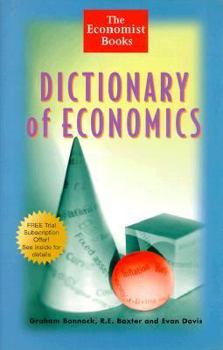The Economist Books Dictionary of Economics
Select Format
Select Condition 
Book Overview
Providing a wealth of essential information in an accessible, user-friendly format, the Dictionary of Economics is packed with more than 1,500 entries that cover everything from acceleration principle, fiscal drag, and marginal utility to ploughing back, saddle point, and yield curve. Featuring a unique micro-encyclopedic treatment with extensive cross-referencing and up-to-date institutional material, it encompasses a wide range of topics, including...
Format:Hardcover
Language:English
ISBN:047129599X
ISBN13:9780471295990
Release Date:November 1998
Publisher:John Wiley & Sons
Length:439 Pages
Weight:1.50 lbs.
Dimensions:1.5" x 6.2" x 8.8"
Customer Reviews
3 ratings
a good reference gets even better
Published by Thriftbooks.com User , 17 years ago
If you think about economics, you need this Economist/Bloomberg Press publication or one very much like it. For clarity on all matters of the public record--not just economics--nobody beat the ECONOMIST newspaper, a British 'news magazine' whose largest national readership is now in the USA. When the style and content gurus at the ECONOMIST get around to publish a dictionary on the terms and nomenclature of the core competence, well, let's just say it's a little bit like watching the World Cup, the Super Bowl, or the World Series (apologies, cricket fans). It doesn't get any better than this. I think you'd better buy one.
Handy and dense
Published by Thriftbooks.com User , 20 years ago
This, the Fourth Edition of The Economist's handy publication, is not a dictionary in the ordinary sense of the term. There is no pronunciation guide and most of the entries are phrases, not single words, e.g., "circular flow of money," "durable goods," "Gibrat's law," "marginal utility," "theory of games," etc. The "definitions" are more like explanations, some of them quite elaborate. Nobel laureate economists are included as well as distinguished economists from the past. Distinguished contemporary economists who have not won the Nobel Prize in economics are not included. Thus Adam Smith makes it; Julian Simon does not, while Herbert Simon, who did win the prize, does.Bayes' theorem is explained in some detail and such terms as "saddle point" and the "Lagrange multiplier," e.g., merit graphs and equations in their definitions, but other terms like the "Black Scholes formula" for derivatives is mentioned but not explained in detail. Obviously the editors Graham Bannock, Ron Baxter and Evan Davis, have their reasons for their hierarchies of ink expenditure. They call their approach "a micro-encyclopedic treatment with extensive cross referencing." The cross references are indicated with two types of grey arrows, one for "see" and another for "see also." Clearly one of their goals is to be as encyclopedic as reasonable without making the volume too large to fit into a briefcase or to be read in bed.Although The Economist is British this publication is aimed at the entire English-speaking world, especially the large market in the United States where this book is published by the Bloomberg Press. Most of the entries betray no national bias, although there are some exceptions. For example in the entry for "balanced budget" it is mentioned that the "UK budget is often in deficit." The same could be said about the US budget, but the US budget is not mentioned. For the entry on "balance of payments" a table is presented with both the UK and the US balance of payments for the year 2001.This book works well for students of economics (and might make a nice gift for someone who is majoring in economics) but why would the general reader want to own such a publication? The answer is that the "dismal science," as economics has been dubbed, is actually an arcane and technical social science, and so an encyclopedic dictionary is most helpful for anyone who follows the financial news. Incidentally the phrase "dismal science" (not an entry in this book!) comes from Thomas Carlyle (1795-1881) who was referring to political economists whom he called, "Respectable Professors of the Dismal Science."Dismal or otherwise, some knowledge of economics is essential for commerce in today's world of business. This book can serve as a reference, or, if you're like me, you can read it as an extension of the Econ 101 course you took in college.
Buy it
Published by Thriftbooks.com User , 24 years ago
Buy it, thats the best advice I can give. This book can help anyone to better understand the field of economics and comprehend economics texts more easily.





